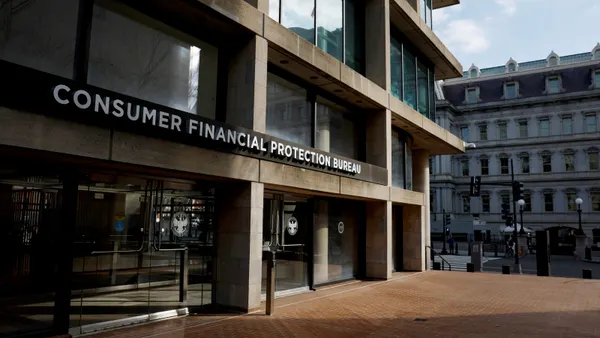The Consumer Financial Protection Bureau wants to rescind a rule that requires nonbank financial firms to register with the agency if they find themselves in the cross-hairs of any court order or regulatory enforcement order.
The registry, adopted last year, was meant to “help the CFPB, the law enforcement community and the public limit the harms from repeat offenders” who violated consumer laws, former CFPB head Rohit Chopra said when it was proposed in 2022.
But it was added to the Federal Register for proposed rescission Wednesday, and the CFPB is now seeking comments on the proposal, as well as any “non-speculative and methodologically rigorous” analysis of the so-called NBR rule’s costs and benefits.
“The Bureau is proposing to rescind the NBR Rule based upon concern that the costs the rule imposes on regulated entities, and which may in large part be passed onto consumers, are not justified by the speculative and unquantified benefits to consumers discussed in the analysis proffered in the NBR Rule,” CFPB Acting Director Russ Vought wrote.
Vought said the “significant regulatory burden” imposed by the NBR rule has been brought to the CFPB’s attention, including by the Small Business Administration’s advocacy office and the Conference of State Bank Supervisors.
CSBS President Brandon Milhorn penned a letter to Vought on Monday, dubbing the registry “government waste.” It cost millions of dollars to construct, he said, yet it houses information easily accessible from other sources, including the Nationwide Multistate Licensing System and Registry. NMLS Consumer Access is a website that allows consumers to access company information and view regulatory orders for state-licensed nonbanks.
It also encroaches on state authority, Milhorn contended, because monitoring for and enforcing compliance with orders based on state law is “exclusively the authority and responsibility of the states, not the federal government.”
The SBA did not immediately respond to a request for comment.
The NBR rule is “not necessary as a tool to effectively monitor and reduce potential risks to consumers from bad actors,” according to Vought.
Information on federal, state and local court orders, and on regulatory enforcement orders, faced by nonbanks was available to the public prior to the registry’s creation, and their availability elsewhere will be unaffected by the rescission, the CFPB said. They would not be tracked by the CFPB and available in one place, however.
Vought suggested nonbanks would experience financial benefits from the rescission “as a result of reduced compliance burden.” That extra money, he suggested, could go toward the development of new products, including for consumers in rural areas, and “products and services could be improved as a result of the proposed recission of the NBR Rule.”
The proposed rescission furthers a deregulatory trend at the CFPB. The agency on Monday rescinded 67 pieces of guidance addressing fair lending, overdraft fees, buy now pay later firms, earned wage access programs and more, in alignment with an internal memo Chief Legal Officer Mark Paoletta sent last month.














